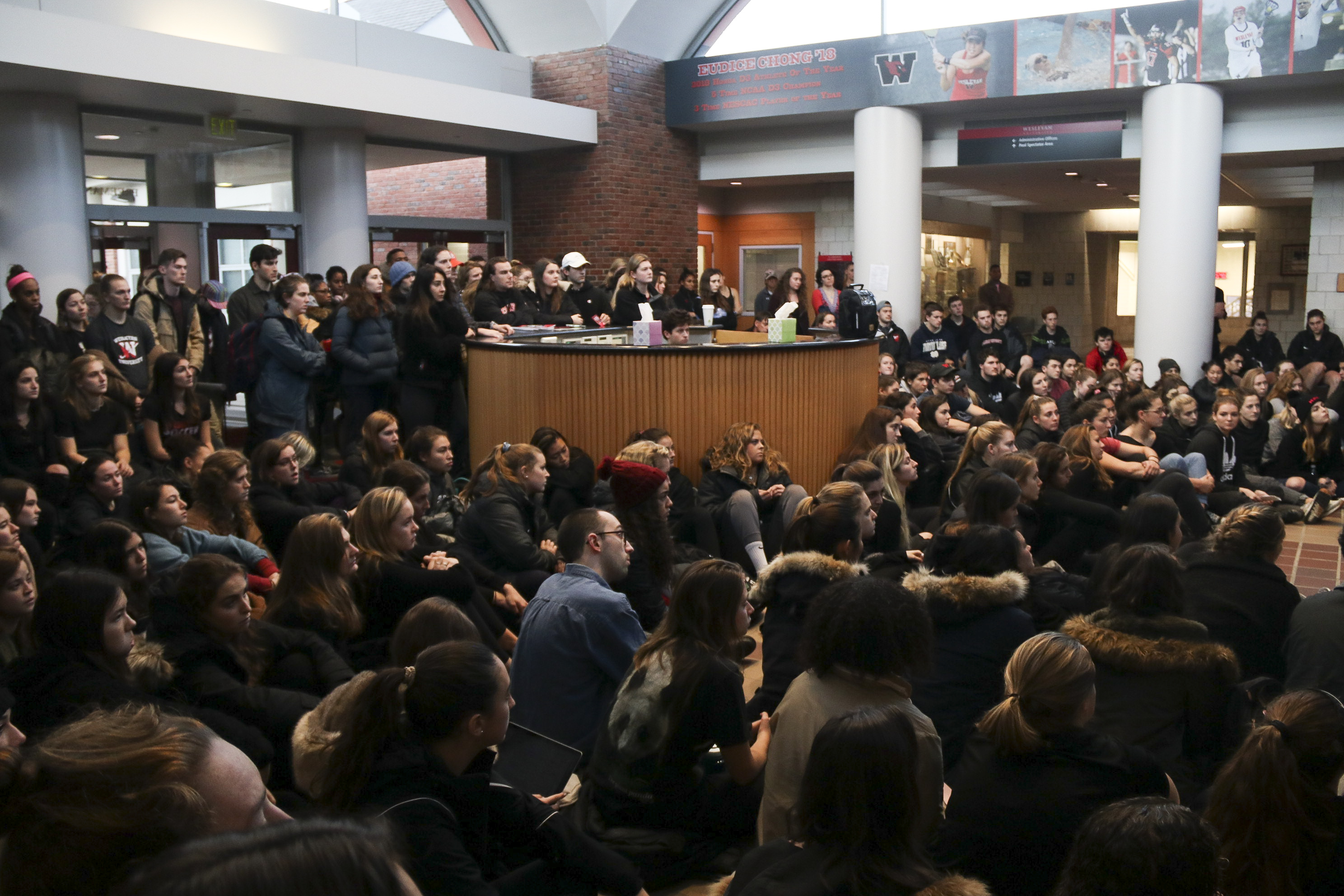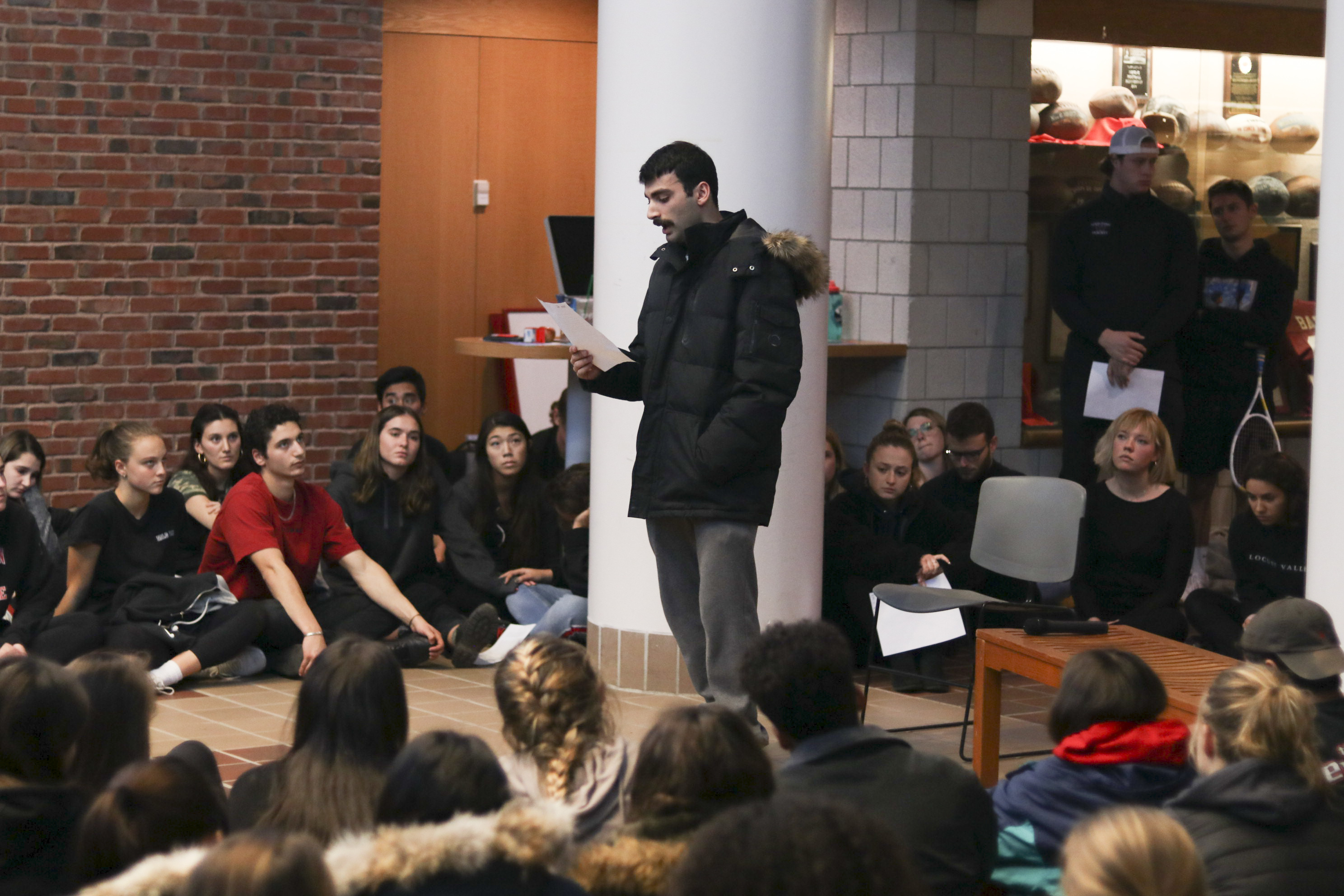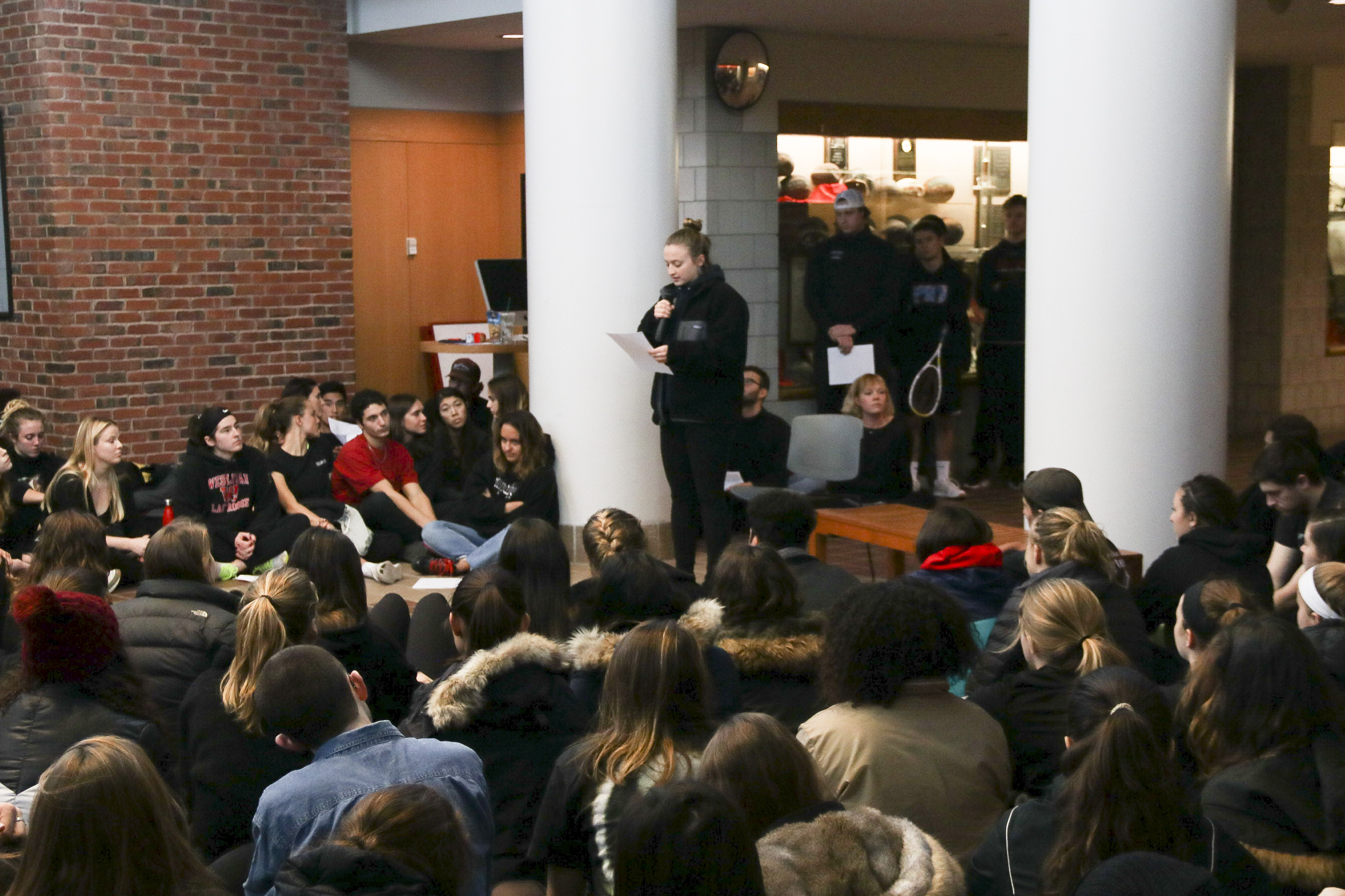
William Halliday, News Editor
CW: This article contains language concerning sexual assault and rape.
Hundreds of students packed the lobby of Freeman Athletic Center Wednesday afternoon for a speak out on sexual assault, standing in solidarity with survivors as they shared their stories.
Over two dozen students spoke at the event, some reading anonymous accounts of sexual assault and rape that were submitted to the event’s organizers and others sharing personal stories. Wearing all black, those who attended the event sat on the floor or stood on the sides of Freeman’s Cross Street lobby, listening quietly as students recounted and reflected on their trauma.
Two of the organizers, Stella Jiler ’21 and Carolina Mahedy ’21, began with a statement expressing the purpose of the gathering, recognizing the undue burden placed on marginalized groups in discussions of sexual assault and emphasizing that, while there were people in the audience with Title IX reporting obligations, their duties did not apply to the stories students would share.
“We are gathered here today to speak out against sexual assault, an epidemic that has plagued our campus, along with many others,” Jiler said. “As their stories are shared, we will hold silent space in solidarity to let them know they are not alone. Sexual assault affects everyone. However, we must recognize that historically marginalized groups experience sexual assault with more prevalence.”
Then, one after another, students told their stories and read the stories of others, bravely detailing assaults that occurred both on and off campus and how they are processing what fellow students, family friends, and strangers had done to them.
“It was an incredibly difficult event to sit through, however the amount of stories we got and the courage it took for survivors to submit them was inspiring,” a statement from the event’s organizers reads. “We’ve all seen the statistics on sexual assault, and can recognize that many of our peers have been and will be assaulted. However, those numbers can be glossed over. The Speak Out breathed life into those stats and gave those numbers a voice to hear and a face to see. It made the stories impossible to ignore.”
Director of the Office of Survivor Advocacy and Community Education Johanna DeBari, who attended as a resource students could turn to during the event, commented on the power of witnessing the vulnerability and strength of those who spoke. She recognized that, while empowering to some survivors, the type of disclosure that occurred on Wednesday is not something with which all survivors feel comfortable.
“It is hard to hear so many students in so much pain, and also beautiful to see how many people showed up in support to bear witness to their narrative,” she wrote in a message to The Argus. “To be seen, heard, and have a community (even if they are strangers) bear witness can be incredibly formative in a survivors’ healing journey. It’s also not something all survivors feel comfortable doing…. Celebrating all ways survivors need to show up and stand in their truth is an important part of doing the work of supporting survivors.”
The gathering was organized by an informal group of students and brought together people from all over campus. While it was held in the center of the University’s athletics community, the Speak Out was not intended to target athletes but instead to recognize that assaults take place within the athletics community and many others like it.

William Halliday, News Editor
Caroline Sgaglione ’19, a member of the women’s lacrosse team and one of the event’s organizers, spoke about how the event served as a way for the athletics community to reclaim a space that has a reputation for fostering a culture of complicity surrounding sexual violence. She also thought that the gathering could allow athletes to show other students that their teams do not condone assault.
“I want the athletics community to…be understood as people who give a lot to the University and not people who are deemed as perpetrators because that’s kind of the assumption on campus,” she told The Argus. “As an athlete, I felt some sort of responsibility to introduce other people to other athletes and show that we’re all in this together…. It’s all about solidarity.”
Echoing this sentiment, Celeste Smith ’19, a member of Eclectic who also helped organize the gathering, spoke about how events like Wednesday’s Speak Out can allow communities that have historically enabled perpetrators of sexual assault to show other students their commitment to change. While she sees the importance of the institutional memory that colors certain organizations as complicit in assault, she thinks that communities can use this reputation to learn from their mistakes.
“Coming from a place that has a really horrible reputation, especially regarding sexual violence and poor misconduct in the past, [we’re] trying to reclaim the space as something that is different now and something that you want to make better in the future,” she said. “It’s hard to get an entire campus to see you differently because of institutional memory…. You should always be afforded the opportunity to move forward and become something better.”
Michelle Fisher ’19 attended the Speak Out as a representative of the Survivor Support Network (SSN), an all-student, university-unaffiliated, peer group run by and for survivors of sexual assault. She commented on how she saw the event as bridging a divide between communities that don’t normally intersect.
“Wednesday’s speak out in Freeman offered a chance to change this perceived athlete/activist divide and reach out to survivors who might not have relationships with current survivors in the network or even know that SSN exists,” Fisher wrote in a message to The Argus. “By centering the intersection between athletes and sexual assault, this action provided an opportunity for survivors with a variety of identities and experiences to join together in solidarity with one another.”

William Halliday, News Editor
Fisher is glad that the Speak Out happened and that survivors of all types could be supported and heard, but she discussed her mixed feelings about the public sharing of trauma as a tactic for changing rape culture and holding perpetrators accountable. She thinks that this sharing of trauma, while creating solidarity among those who identify with it, empowering survivors to control their own narratives, and inducing short-term feelings of guilt and empathy, does little to enact lasting social change.
“This tactic of public confession relies on the assumption that if we just make people feel bad enough about an issue, they will be driven to action—supporting survivors, fighting against rape culture, or changing their own violent behaviors—which will ultimately lead to the elimination of sexual assault,” Fisher wrote. “I think this is well-intended—noble even—but dangerously naive.”
The stories shared at the event illustrated how perpetrators of sexual assault don’t think rationally about how they can use their power to take advantage of another individual for their own pleasure, and Fisher spoke about the reality that there were some students in the audience who had committed assault but failed to realize it, even when confronted with their peers’ stories.
“Most rapists don’t even think of themselves as rapists,” she wrote. “I can guarantee that there was at least one person who has committed sexual assault who was listening to the painful stories being shared and thinking to themself, ‘How horrible. How could anyone do such a thing?’ I would venture to say that there were many.”
The organizers of the event have been engaging in ongoing conversation with administrators. Acknowledging that the administration exists to support students, they see an open line of communication between students and the administration as crucial to changing the way the University’s sexual assault reporting process works. They want to see cases’ timelines shortened and more resources provided to students as they go through the reporting and adjudication process.
“The administration has to know what’s going on,” Sgaglione said. “We want to use this platform to show the administration that we’re upset and want something to happen…. We’re seniors now, and we’ve seen so much go down, and this is our opportunity to say, ‘This is not okay.’”
Regardless of next steps, the students who organized the gathering see the stories shared on Wednesday and the support offered by the hundreds of students who attended as, if anything, elevating survivor narratives and pushing forward conversations that will continue long after they graduate.
“The Speak Out was a success regardless if any action follows,” the organizers’ statement reads. “It fostered a space of solidarity that allowed survivors’ stories to be shared. However, we certainly don’t want the ball to stop there. This event came on the heels of all the hard work done by past and present Wesleyan students. The Speak Out reopened the conversation for some and began it for many more.”
William Halliday can be reached at whalliday@wesleyan.edu.
Comments are closed